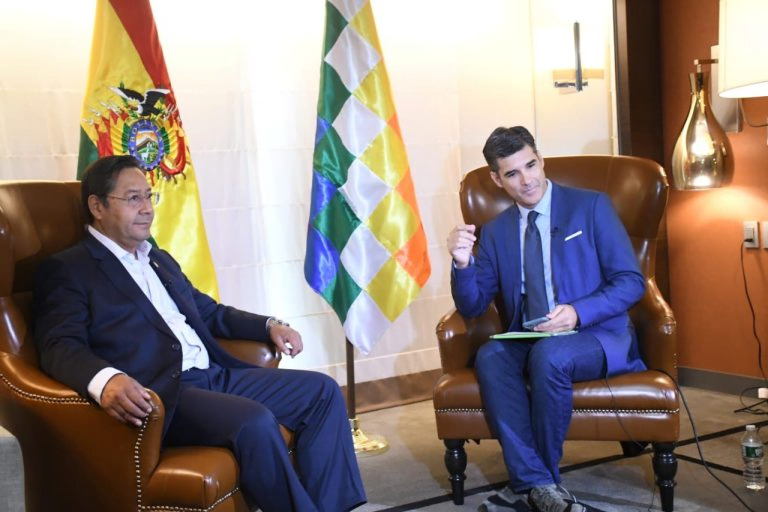
In an exclusive interview with Actualidad RT, Bolivian President Luis Arce referred to the coronavirus pandemic, saying that unfortunately, it has shown that "health is now just another commodity."
New York, September 25 (RHC)-- In an exclusive interview with Actualidad RT, Bolivian President Luis Arce referred to the coronavirus pandemic, saying that unfortunately, it has shown that "health is now just another commodity."
The Bolivian president Luis Arce gave an exclusive interview to RT after his first speech at the United Nations General Assembly in New York. In his remarks, the president referred to the situation of the Organization of American States (OAS), whose "gait, behavior and conduct" is questioned by several Latin American countries.
"The strengthening of CELAC [Community of Latin American and Caribbean States] is an alternative to bury the OAS," said Arce, as one of the options being considered in relation to this regional organization. "It is a body that was born precisely from political life to replace the OAS," he added.
CELAC, he said, "marks the possibility of being able to agree" on the "common interests and needs" of the countries of the region. Arce insisted that what is most questioned about the OAS is the conduct of its Secretary General, Luis Almagro, who, Arce said, "is the one who is putting a negative stamp" and "has given a political tinge" and "interference" to the organization.
He reiterated that under Almagro's leadership of the OAS, the coup d'état in Bolivia was supported, after the OAS presented a preliminary report of the 2019 elections, which based on lies and falsehoods. The report was not in the agreement signed with then President Evo Morales, "where irregularities were insinuated"; anomalies "that were never later demonstrated," but that, nevertheless, "from that all the facts, including violence" broke out in the South American country, which left 38 dead and the installation of a de facto government, headed by Jeanine Áñez.
The Bolivian president also referred to the coronavirus pandemic, saying that unfortunately, it has shown that "health is now just another commodity." He emphasized that health care is "a commodity that, under the current capitalist system, has shown a total dehumanization."
In this sense, he criticized "the fact that companies have the intellectual property" and that the formula for manufacturing vaccines against COVID-19 is not offered to countries that can produce it and thus accelerate the process of vaccinating the population. Even so, he clarified, the companies "continue to win" and rake in huge profits.
"The lesson for humanity is clear: health cannot be a commodity, scientific advances aimed at improving people's health cannot be a commodity." Luis Arce considers that the delay in vaccinations, especially in the poorest countries, means that the coronavirus pandemic cannot be overcome.
In particular, on the fight against the pandemic in Bolivia, he reported that the de facto government, which handed over power in November 2020, "did not buy a single vaccine" against the coronavirus. Therefore, his administration was the one that reached the agreements for the supply and currently has about 55% of the population vaccinated.
On the other hand, Arce pointed out that since 2006, Bolivia's economic policy does not contemplate any financial program with the International Monetary Fund (IMF), since, he justified, what the agreements with this organization generate "are conditionalities" with which the Bolivian Government does not agree.
This policy of not signing agreements with the IMF was broken, he said, only during the de facto government, which "was committing itself to devaluing the currency" in a credit contract with the U.S.-based financial organization. He recalled that, for that reason, once he took the Presidency, Bolivia returned 351.5 million dollars to the IMF, which were part of that credit requested in April 2020 by Áñez.
"We have our own economic model that has been successful" and "is giving good results for the country," commented the Bolivian President, and indicated that his own policy has contributed to the reduction of poverty, inequality and unemployment indexes, and has allowed Bolivia to grow.

